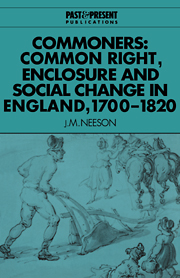Book contents
- Frontmatter
- Contents
- List of tables
- Preface
- Introduction
- 1 The question of value
- I SURVIVAL
- II DECLINE
- 7 Two villages
- 8 Decline and disappearance
- 9 Resisting enclosure
- III CONCLUSION
- Appendix A Using the Land Tax
- Appendix B Acreage equivalents
- Appendix C Correcting and editing the Land Tax
- Appendix D Landholding estimates
- Bibliography
- Index
- Past and Present Publications
7 - Two villages
Published online by Cambridge University Press: 01 February 2010
- Frontmatter
- Contents
- List of tables
- Preface
- Introduction
- 1 The question of value
- I SURVIVAL
- II DECLINE
- 7 Two villages
- 8 Decline and disappearance
- 9 Resisting enclosure
- III CONCLUSION
- Appendix A Using the Land Tax
- Appendix B Acreage equivalents
- Appendix C Correcting and editing the Land Tax
- Appendix D Landholding estimates
- Bibliography
- Index
- Past and Present Publications
Summary
For a very long time commoners had lived with the possibility and the reality of enclosure but in the middle of the eighteenth century enclosers began to use private Acts of Parliament to enclose whole parishes. Gone was the slow, negotiated process of piecemeal enclosure in which closes or woods were taken out of the system and common rights were abated by general agreement. In its place came a process that dispensed with the need for much agreement and enclosed an entire parish in five to ten years, and when it was done all common right had gone.
We have seen that commoners had always negotiated or resisted enclosure, as they had always negotiated the rules of their shared agriculture. Not surprisingly, some resisted parliamentary enclosure too. Opponents of enclosure had a tradition to call on, a solidarity that had worked well before. But in the end (and for some parishes the end was not until the nineteenth century) they were unsuccessful and enclosure went through. When it did, many small commoners lost land as well as common right. Resistance, changes in landholding, and their significance, are the subjects of the second half of this book.
I want to begin by looking at two Midland common-field villages that were enclosed by Act of Parliament in the eighteenth century: West Haddon and Burton Latimer. They illustrate an argument made earlier: that hill and vale parishes, though not areas of abundant common waste like the fenland or forest, might still support a commoning economy until enclosure.
- Type
- Chapter
- Information
- CommonersCommon Right, Enclosure and Social Change in England, 1700–1820, pp. 187 - 220Publisher: Cambridge University PressPrint publication year: 1993

